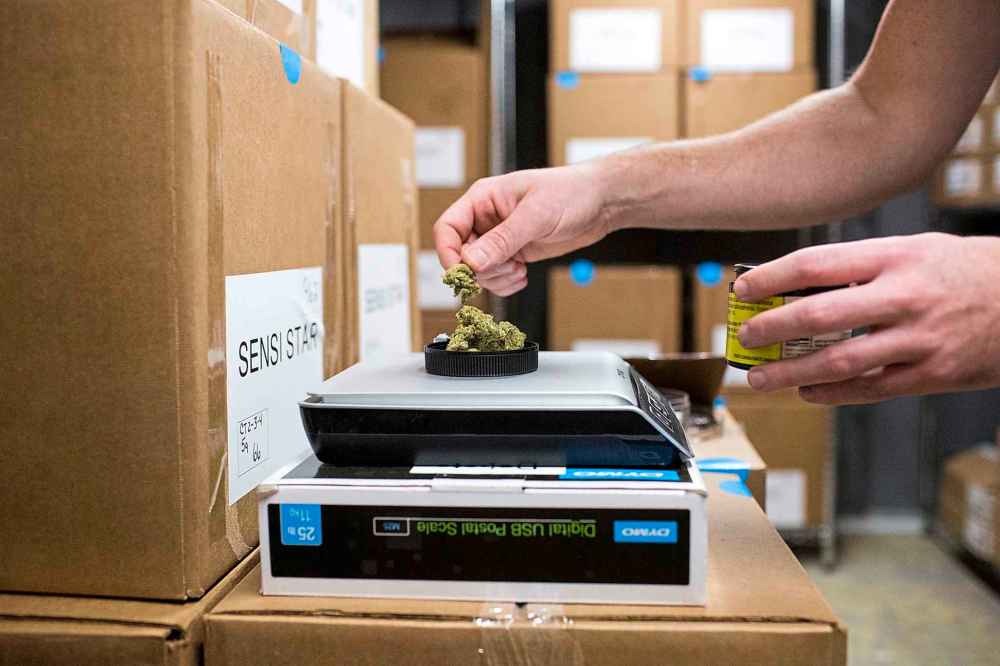Ready to roll 100-year pot prohibition comes to an end — here's what you need to know
Read this article for free:
or
Already have an account? Log in here »
To continue reading, please subscribe:
Monthly Digital Subscription
$19 $0 for the first 4 weeks*
- Enjoy unlimited reading on winnipegfreepress.com
- Read the E-Edition, our digital replica newspaper
- Access News Break, our award-winning app
- Play interactive puzzles
*No charge for 4 weeks then billed as $19 every four weeks (new subscribers and qualified returning subscribers only). Cancel anytime.
Read unlimited articles for free today:
or
Already have an account? Log in here »
Hey there, time traveller!
This article was published 15/10/2018 (2017 days ago), so information in it may no longer be current.
Nearly a century after Canada outlawed marijuana, the psychoactive plant is legal once again.
However, the federal Cannabis Act that takes effect Wednesday does much more than simply “Legalize It,” as the old Peter Tosh tune urged.
Instead, the new law brings to life the Liberal government’s promise to “legalize, regulate, and restrict access to marijuana.” It replaces the old, sweeping prohibition on cannabis for non-medical purposes with a regime that lets federally regulated companies grow marijuana, then sell it to adults through provincially regulated stores.

That federal initiative never sat well with Manitoba’s Progressive Conservative government.
“My colleagues and I have made clear: the federal government rushed this,” Health, Seniors and Active Living Minister Cameron Friesen told reporters a week ago. “We warned them that this was a rush job. Nevertheless, we had to get ready.”
Whether Manitoba’s ready or not, legalization is here — and with it, new rules.
Manitobans must be at least 19 years old to legally purchase and use marijuana — a year older than the age of majority for alcohol. Anyone under the age of 19 won’t even be allowed to enter legal cannabis stores in the province.
Retailers roll out pot delivery service
They do it for pizza, so why not pot? Manitobans who want access to legal cannabis without standing in line will be able to order home delivery.
They do it for pizza, so why not pot?
Manitobans who want access to legal cannabis without standing in line will be able to order home delivery.
Delta 9 Cannabis will accept online orders at Delta9.ca as of 12:01 a.m. Wednesday, for delivery that afternoon. The company’s same-day deliveries in Winnipeg will be managed by Pineapple Express, a bonded courier company.
“There’s a bunch of windows, there’s 1:00 to 3:00, 3:00 to 5:00, et cetera,” said Delta 9 communications director Gary Symons.
“So you pick one of those windows, and they’ll come within that window.”
Deliveries from Pineapple Express will cost $9, or $11.25 for rush evening deliveries. Canada Post delivery will also be available for customers in Winnipeg and beyond, but will take one to three days to arrive.
“We’re expecting demand is actually going to be pretty high, and that’s one reason we’re not initially promising that one-hour delivery, because we know there’s a lot of pent-up demand, and I think a lot of people are going to want to make history by making their orders on the first day,” said Symons.
“Particularly because there’s not going to be that many retail stores, I think the online side is going to be much higher than it would have been otherwise.”
Legal cannabis can only be delivered to someone who’s at least 19 years old, and who passes an ID verification upon delivery, according to regulations from the Liquor, Gaming and Cannabis Authority of Manitoba. Cannabis can’t be delivered to someone who “appears to be an intoxicated person,” and the recipient must sign a form confirming the receipt of delivery.
Under Liquor, Gaming and Cannabis Authority regulations, cannabis deliveries may only take place between 8 a.m. and 12:30 a.m., or 1 p.m. to 12:30 a.m. on Remembrance Day.
By Tuesday evening, six such stores had received the thumbs-up from Manitoba’s cannabis regulator, the Liquor, Gaming and Cannabis Authority of Manitoba:
- Delta 9 Cannabis Store (827 Dakota St., Winnipeg);
- Hiku/Tokyo Smoke (55B Goulet St., Winnipeg);
- Meta Cannabis Supply Co./National Access Cannabis (Unit 23, 584 Pembina Highway, Winnipeg);
- Tweed/Canopy (120 Osborne St., Winnipeg);
- Tweed/Canopy (1592 Regent Ave., Winnipeg);
- Tweed/Canopy (1450 Main St. South, Dauphin).
Selling marijuana through unlicensed channels remains illegal. However, as of Wednesday, adult Manitobans can do the following without breaking federal or provincial laws:
- Buy up to 30 grams of dried marijuana at a legal outlet, or order it for home delivery;
- Possess up to 30 g of marijuana in public;
- Possess any amount of marijuana at home;
- Share up to 30 g of marijuana with another adult;
- Transport marijuana in the trunk of a car (or behind the back seat of a vehicle such as a van or hatchback), or in a public vehicle such as a taxi or bus;
- Smoke or vaporize marijuana at home or on private property;
- Cook marijuana into an edible form.
It will be illegal to do the following in Manitoba, with a few special exemptions for registered medical cannabis users:
- Buy, sell or possess any amount of “illicit” cannabis (essentially, any marijuana produced or sold illegally);
- Smoke or vaporize marijuana anywhere in public, or in a vehicle;
- Grow any amount of marijuana;
- Give marijuana to someone who’s intoxicated;
- Give marijuana to someone younger than 19;
- Drive while impaired by marijuana or any other drug.
Manitoba’s supply of legal cannabis will come from 15 different Health Canada-regulated suppliers, according to provincial wholesaler Manitoba Liquor & Lotteries Corporation.
Delta 9 Cannabis and Bonify — the only two Manitoba-based companies licensed by the federal government to grow and sell cannabis — are both on the list, as are bigger players such as Ontario-based Canopy Growth Corp. and New Brunswick-based Organigram.
Dried marijuana bud (the pungent, smokable flower of the female cannabis plant) will be the main product on sale at Manitoba’s cannabis stores Wednesday. Pre-rolled joints should also be available, along with a range of cannabis accessories such as bongs, pipes and vaporizers.
Consumers looking for a smoke- or vapour-free option will have to wait until 2019 to legally buy edible cannabis products, although they’re welcome to make their own weed-infused food at home. However, some legal cannabis stores may carry ingestible cannabis oils or capsules.
Some of the companies selling legal weed in Manitoba are also producers, but consumers shouldn’t expect cheaper prices from those vertically integrated firms.
In order to get their bud from the factory floor into consumers’ shopping bags, those companies have to sell it to MLL, buy it back at a markup, then sell it again at retail prices. Manitoba will exempt legal cannabis from provincial sales tax, but the government will start charging cannabis retailers a six per cent “social responsibility fee” on revenues, beginning in 2019.
Light-up at legislature?
For years, cannabis lovers in Manitoba have spent April 20 on the lawn of the provincial legislature in Winnipeg, puffing away in a smoky display of civil disobedience.
For years, cannabis lovers in Manitoba have spent April 20 on the lawn of the provincial legislature in Winnipeg, puffing away in a smoky display of civil disobedience.
However, a provincial spokesperson tells the Free Press there’s no smoke-out planned for legalization day Wednesday.
“Nothing is scheduled to take place at the legislature related to the legalization of non-medicinal cannabis,” spokesperson wrote Tuesday. “Provincial legislation prohibits using cannabis in public places, which includes the (Manitoba) Legislative Building and grounds.”
Local activist Steven Stairs has organized previous cannabis events on the legislature grounds, and expects people to show up to celebrate regardless.
“I don’t see them publicly giving the green light to come smoke pot at their venue, because they would be publicly telling you to break the law,” Stairs said. “If you were to ask them about what happens (on) 4/20, they’d probably give you the same answer.”
The provincial fine for smoking or vaporizing cannabis in public is $672, regardless of the number of offences.
Those taxes and markups raise questions about the price of legal cannabis, and whether legalization can achieve Ottawa’s goal of diminishing Canada’s thriving black market. Although there’s no government-mandated price for legal marijuana in Canada, all signs indicate the initial supply will be more expensive than the illicit product cannabis users are accustomed to buying.
In Ottawa, the Liberals’ lead minister on the cannabis file told reporters Tuesday federal departments will analyze whether legalization ultimately puts a dent in the black market.
“I think it’s important to also acknowledge that’s not going to happen on Day 1. It begins to happen tomorrow. But there is a very strong desire and a commitment from the provinces, territories, and from our government to continue to work together to eliminate that market,” said Minister of Border Security and Organized Crime Reduction Bill Blair.
“For the first time, starting tomorrow, there will be competition in the marketplace. And for adult consumers who choose to use cannabis, they’ll have a socially responsible, safer, and legal choice.”
— with files from Dylan Robertson
solomon.israel@freepress.mb.ca
@sol_israel
How Canada will regulate legal cannabis: A flowchart
Consumers will have two legal routes to access marijuana: an existing medical cannabis regime, plus a new recreational cannabis regime. Trying to visualize how it all fits together? Check out our legal cannabis flowchart:

Medical
Government of Canada
Health
Canada
Regulates
Regulates
Personal production or designated grower
Licenced
cannabis
producer
Sells to
Physician
Authorizes
registration for
Medical user
Recreational
Government of Canada
Provincial and territorial governments
Health
Canada
Regulates
Regulates
Personal
production
Licenced cannabis producer
Sells to
Provincial and territorial wholesale cannabis distributor
Sells to
Retailer
Sells to
Recreational user

Medical
Recreational
Government of Canada
Government of Canada
Provincial and territorial governments
Health
Canada
Health
Canada
Regulates
Regulates
Regulates
Regulates
Personal production or designated grower
Licenced
cannabis
producer
Personal
production
Licenced cannabis producer
Sells to
Sells to
Provincial and territorial wholesale cannabis distributor
Physician
Authorizes
registration for
Sells to
Medical user
Retailer
Sells to
Recreational user

Medical
Government of Canada
Health
Canada
Regulates
Regulates
Personal production or designated grower
Licenced
cannabis
producer
Sells to
Physician
Authorizes
registration for
Medical user
Recreational
Government of Canada
Provincial and territorial governments
Health
Canada
Regulates
Regulates
Personal
production
Licenced cannabis producer
Sells to
Provincial and territorial wholesale cannabis distributor
Sells to
Retailer
Sells to
Recreational user













